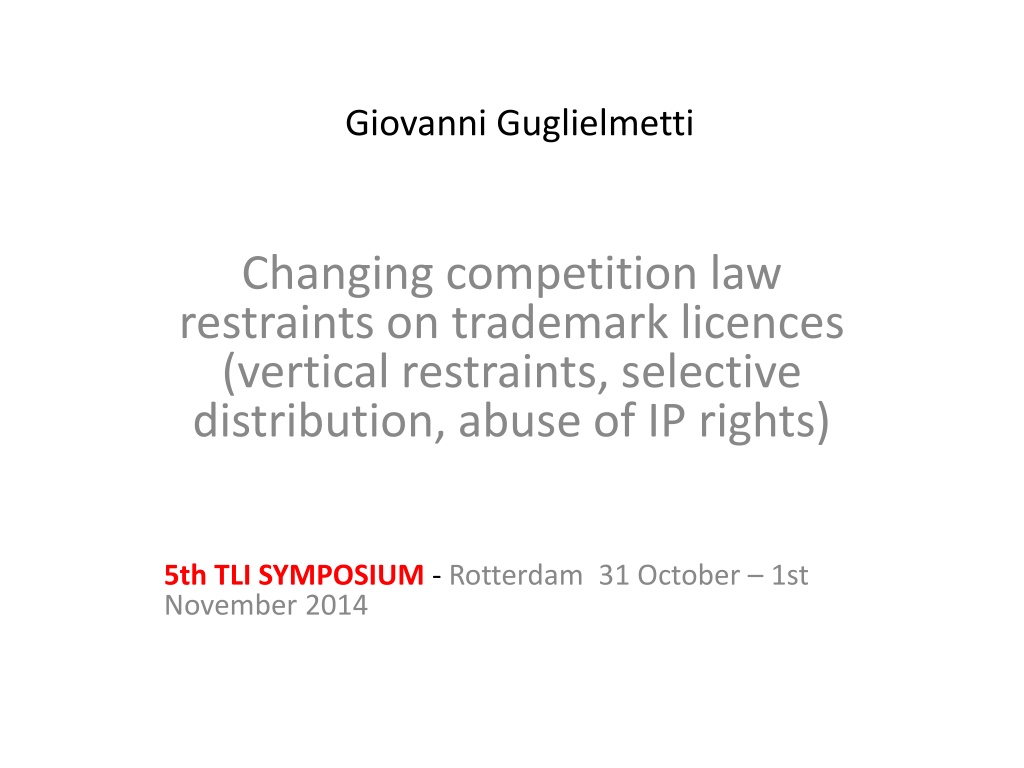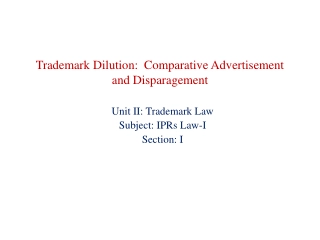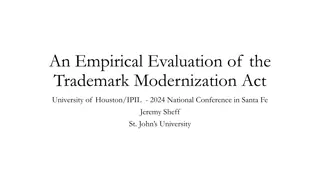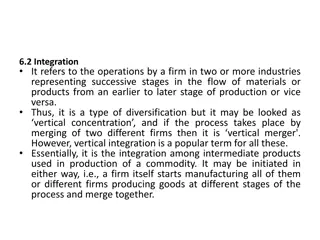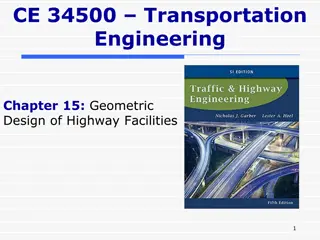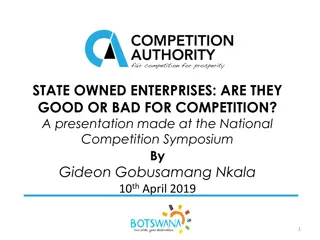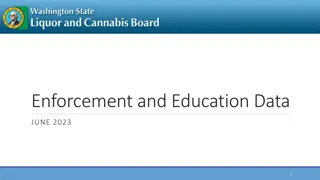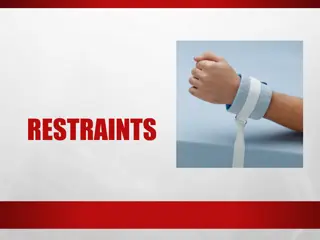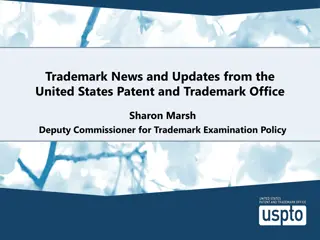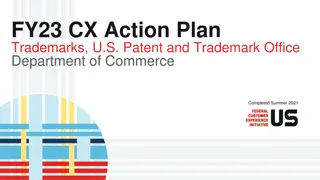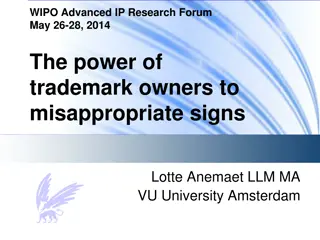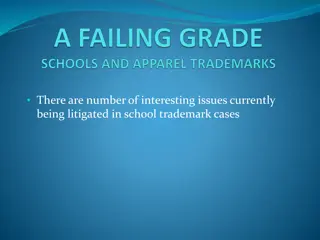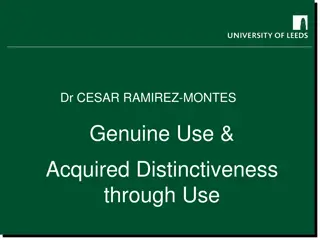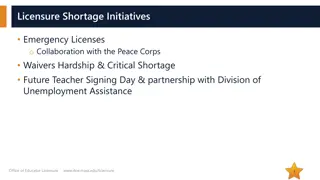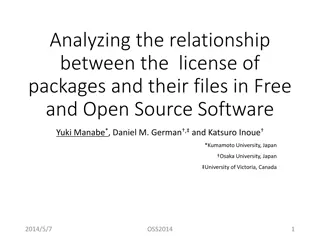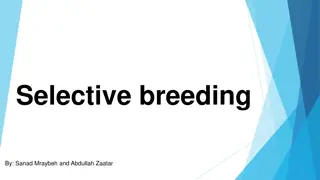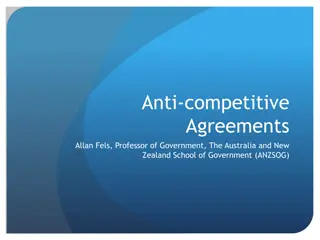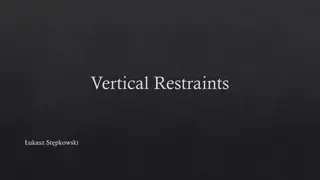Competition Law and Trademark Licenses: Understanding Vertical Restraints and Selective Distribution
Exploring the application of antitrust rules to trademark licenses under Art. 101-102 TFEU, this discussion delves into the complexities of restraints on trademark licensing, the exemptions under various regulations, and the impact on market competition. Insights from EC case law and Commission decisions shed light on the nuanced considerations involved in protecting well-known trademarks while maintaining market dynamics. Understanding the interplay between intellectual property rights, market power, and competition principles is crucial in navigating trademark licensing agreements.
Uploaded on Sep 06, 2024 | 0 Views
Download Presentation

Please find below an Image/Link to download the presentation.
The content on the website is provided AS IS for your information and personal use only. It may not be sold, licensed, or shared on other websites without obtaining consent from the author. Download presentation by click this link. If you encounter any issues during the download, it is possible that the publisher has removed the file from their server.
E N D
Presentation Transcript
Giovanni Guglielmetti Changing competition law restraints on trademark licences (vertical restraints, selective distribution, abuse of IP rights) 5th TLI SYMPOSIUM - Rotterdam 31 October 1st November 2014
Antitrust rules applying to Trademark Licenses Artt. 101-102 TFEU Not generally block exempted under Reg. 19/65/EEC, but: VABER (Reg. 330/2010) art. 2.3 TM license ancillary to VA TTBER (Reg. 316/2014), art. 2.3 TM license part of TT (mixed agreements) EC case law: old and scarce no ECG decisions Commission decisions: Campari (1977) Moosehad / Whitbread (1990)
Art. 101 pro competitive built-in principles (doctrine of separability of trademark from product, descriptive TM, free uses, etc.) but protection of well known trademark as property rights beyond confusion may create market power Ownership of trademark per se does not confer market power: other parties are free to sell the same goods under different trademarks, but well known trademark may confer an important advange in entering or competing in a certain market (Moosehead/Whitbread 15) Branding tends to increase product differentiation and reduce substitutability (VA Guidelines 104) In principle Commission does not apply the same principles developed in TTBER to trademark licensing (TT Guidelines 50) If the aim of the agreement is to decentralise manufacture and rationalise distribution to promote the sales, non compete obligation on licensees have efficiency effects similar to exclusive dealings agreements and not restrictive effects as in patent or other creativity results protecting IP (Campari III.2)
Art. 101 Campari (1977): Restrictive but exempted (improve production and distribution, protect investment) - exclusivity - Restriction on active sales outside allocated territory (passive not exempted) - Non compete (different from patent licensing agreement / similar to exclusive dealing agreement) - Obligation to supply the Italian product to certain group of customers (diplomatic corps, foreign armed forces etc.) promote brand loyalty Not restrictive: - Export ban outside the common market where reimportation unlikely (taxes, duties, trade margins) - Quality control (restrictions in the use of plants) - Quality control (supply of secret raw material/ supply of non secret raw material not exempted) - Confidentiality - Minimum spending adv - non assignment obligations on licensees
Art. 101 Moosehad / Whitbread (1990) Restrictive but exempted - Exclusivity - Prohibition of active sales outside the territory - Non compete Not restrictive: - Limitation on the use of know-how - Confidentiality of know how - Qualitative standards (including purchasing obligation) no- challenge: - Ownership or relative ground of refusal not restrictive (since any other party is prevented in any event ) - Absolute ground the restriction is appreciable only for well known trademarks which represent an important advantage
Per se unlawful Price fixing (VABER, 4(a) TTBER artt. 4.1(a) 4.2(a)) with the exception of maximum sale price and recommended sale price between non competitors (in US also minimum RSP under rule of reason Leegin /PSKS S.Ct 2007) Absolute territorial protection (C 258/78 Nungesser, 29, Campari , IB) and other contractual provision impairing the effect of the exhaustions of rights (labelling to monitor the parallel market, monitoring etc. see C-244/00 Va Doren 40, third party realeased from the burden of the proof if real risk of partitioning of markets occurs), but under TTBER absolute territorial protection possible if licensor reserved to itself a certain territory, and between licensor and licensee absolute ban on selling contract goods to end user via internet breaches the obligation not to restrict passive sales in a selective distribution network Pierre Fabre C 439/09 Restrictions on the use of keyword and other online adv non related to quality ? See C 323/09 Interflora, 57-8 it is not the purpose of the trademark to protect its proprietor against practice inherent in competition, internet adv on the basis of keywords corresponding to trademarks costitutes such practice in that its aims is merely to offer alternatives to the offer of the trademark proprietor
May in some circumstances be unlawful Some no challenge (obiter Moosehead Whitebread, TTBER, 5.1(b) but exempted the termination in exclusive license), in trademark license mixed with TT (see C 193/83 Windsurfing, 81, caught by art. 101 but it did not consider whether it can be exempted) Tying: obligation to buy from licensor certain non secret raw material (Campari 1B) unless needed for quality control ? (but see in US Illinois Tool v. Independent Ink, S Ct. 2006, tying product patented is not a presumption of market power)
Lawful Limitation to certain goods/services (see art. 8 TrDir) Quality control (manufacturing standards, obligation to purchase certain materials, packs and products approvals) (see art. 8 TrDir) Confidentiality for know how / obligation to buy secret raw materials Minimum sales / adv expenditures (if no foreclosure problem exists) Exclusivity No challenge for ownership / relative grounds Enforcement obligations Assignment prohibition /change of control
VABER Negative effects of vertical restrains are: - Foreclosure of suppliers / buyers - Softening of intrabrand (buyers) or interbrand (suppliers) competition - Obstascle to market integration Art. 2.3, apply to: a) Vertical agreement (purchase, sale resale of goods/services) b) IP not primary object c) License to buyer (not to supplier) d) Faciliting use, sale resale of goods/services by the buyer VBER Covers: Franchising agreement Distribution agreement Selective Distribution Doesn t apply to: a) Pure license agreement b) contract manufacturing with supplier
VABER Block exempted : if supplier market share does not exceed 30% relevant market Franchising agreement (VA Guid. 45): - Franchisee non compete (whole duration of the agreement) - Franchisee confidentiality obligations (unlimited in time) - Grant back non exclusive know how license to francisor - Obligation concerning the enforcement of the IPR by franchisor - Obligation on franchisee not to use IP for any other purposes - Non assignment obligation - - - Individual Expemption: - importance of the transferred know how Non compete necessary to the common idenitity and reputation of the franchisor network (whole duration of the agreement) -restriction on selling (contract territory and selective distribution) -
VABER Block exempted: Selective Distribution (qualitative/quantitative) - Restriction of active/passive sales to unauthorised distributors in the territory reserved by supplier to operate that system (C-59/08 Copad/Dior, 50: only contravention of provisions in art. 8(2) the EC Directive precludes exhaustion, trademark enforcement against unauthorised distributors to protect the aura of luxury of the trademark, as jeopardsing it might affect quality of the luxury good which includes aura of luxury which can be preserved by characterists and conditions of a selective distribution system, 25-30) Qualitive standard also for the use of internet and excluding pure online sale shops (54) - Block exemepted: Exclusive distribution: - Restriction of active sales into the exclusive territory or customer group allocated to supplyer or another buyer (C-244/00 Van Doren, 40, third party should not be required to disclose the source of the trade marketed product provided by a member of an exclusive distribution system as this would raise the risk of market partitioning by trademark proprietor)
TTBER ART. 2.3 Applies to other IPRs licenses (including trademarks): - Contained in technology transfer agreement - Directly related to the production or sale of the contract products - Even if the main interest of the parties is the exploitation of the trademark TTBER applies to mixed patent (and/or know how) / trademark license with an obligation to use the trademark on the products exploiting the technology
Art. 102 TFEU refusal to grant a license not per se abusive but it may if it - Prevents the emergence of a new product, for which there is a potential consumer demand - Is unjustified by objective consideration - prevents any competition in the secondary market which is therefore reserved to the dominant undertaking But see Trips art. 21 compulsory licensing shall not be permitted (in contrast to art. 31 (k) explicitly admitting compulsory patent license as a remedy for anticompetitive practice) Is it applicable to trademarks which do not hinder the marketing of products under different trademark ? Collective licensing of trademarks sport leagues for merchandising (American Needle v NTL US SCt 2010). How to define relevant market and new product (are apparel with certain trademarks new products? And videogames or software which needs to use all the trademark together ?). The market of spare part and the enforcing of trademark rights against parallel importers (but see Oracle v Mtech Data Limited UK S.Ct 2012) C 241-242/91 Magill C-418/01 IMS: exclusionary abuse
Art. 102 TFEU Exploitative abuses (102 a): Grune Punkt / Duales System (collective waste recovery system) Commission 2001/463 / ECG C- 385/07): - imposing trademark licenses for all products + - calculating license fees charged for certain services on all products even those for which services are not provided. - See TTBER Guidelines 101, for royalties calculated also on sales for product non using the licensed IP - Royalty discrimination (102 c) by collective licensing organizations (eg. League merchandising)
